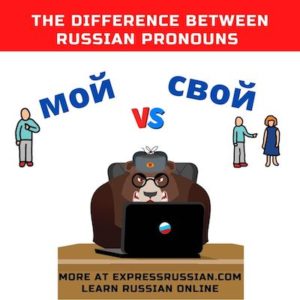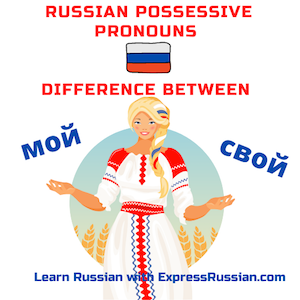In this article:
What’s the difference between Russian pronouns мой (mine) and свой (one’s own)?
The difference between МОЙ and СВОЙ (“mine” and “own”, respectively) is not easy to understand for Russian language learners, especially for beginners.
Let’s learn to use these Russian pronouns correctly!
Pronouns МОЙ and СВОЙ / ТВОЙ / ЕГО / ЕЁ / НАШ / ИХ
First and foremost, let’s define the category of these pronouns –
мой / свой / твой / его / её/ наш / ваш / их –
are Russian Possessive Pronouns
МОЙ = mine, my, my own. “Мой” always refers to “me”, regardless of the subject.
We use твой/его/её/наш/ваш/их when we’re talking about SOMEONE ELSE’s things. The subject and the owner are DIFFERENT persons. Let’s illustrate that with examples:
Я взял ЕГО́ кни́гу. = I took HIS book.
Мо́жно Я возьму́ ТВОЮ́ кни́гу? = Can I take YOUR book?
ОНА́ но́сит ЕГО́ очки́. = SHE wears HIS glasses.
ОНИ́ прие́хали в НА́ШУ страну́. = THEY came to OUR country.
МЫ нашли́ ЕЁ докуме́нты. = WE found HER documents.
Difference between СВОЙ vs МОЙ / ТВОЙ / ЕГО
СВОЙ = own = in a different context, it can mean “mine” or “your” or “his” depending on the subject (to whom this possession belongs)
Note! Use СВОЯ for feminine gender and СВОИ for plural
Russian pronoun СВОЙ is reflexive, that is, it refers to whoever the subject is (he > his or his own, you > your or your own, etc)
In other words,
we use МОЙ when talking about OURSELVES
we use СВОЙ when talking about SOMEONE ELSE INSTEAD OF saying HIS, HER etc
Он/она/они включи́л/включи́ла/включи́ли СВОЙ компью́тер – He/she/they turned HIS/HER/THEIR computer on.
Compare:
ОНИ лю́бят СВОЙ гóрод. = ОНИ лю́бят ИХ гóрод (sounds unnatural in Russian). “ОНИ лю́бят СВОЙ гóрод” is better because it helps to avoid repetition.
ОН выгу́ливает СВОЮ́ соба́ку. If you say «ОН выгу́ливает ЕГО́ соба́ку» the meaning would be ± “HE is walking SOME OTHER GUY’S dog (NOT HIS OWN)”, plus it sounds confusing in Russian, so better say ОН выгу́ливает СВОЮ́ соба́ку if you mean “HE is walking HIS OWN dog”
Pronouns vs Articles
Remember: Russian nouns do not require determiners (articles) as English nouns do, so you wouldn’t use possessive pronouns as much as you do in English:
“Я умы́лся_” = “я умы́л __ лицó” = I washed MY face
You’d almost never say “Я умы́л СВОЁ (МОЁ) лицó” in Russian.
or
Я забы́л __ ключи́ от маши́ны в __ ку́ртке = I left MY car keys in MY jacket. “Я забы́л МОИ́/СВОИ́ ключи́ от маши́ны в МОЕ́Й/СВОЕ́Й ку́ртке” would be technically correct but rather unnatural in Russian.
Therefore, you would only use МОЙ/СВОЙ if ownership context is not clear or to specifically contrast or emphasise.
So МОЙ would be used to contrast with persons other than me:
HE took MY book – ОН взял МОЮ́ кни́гу.
We use pronoun СВОЙ to emphasise ownership (my own, his own, your own etc), e.g.:
Я всегда́ беру́ СВОЁ полоте́нце в спортза́л (я не по́льзуюсь полоте́нцем, кото́рое даю́т в спортза́ле) = I always take MY OWN towel to the gym (I don’t use the towel they give in the gym)
МЫ живём в СВОЁМ до́ме (мы не снимаем этот дом, мы владеем этим домом) = WE live in OUR OWN home (WE don’t rent it, we OWN it)
In this article, we spoke about the difference between мой and свой – Russian possessive pronouns, learn more about other
Russian Pronouns (The Ultimate Guide)

This is an extract of the course “Russian For Beginners“. Looking for a crash course to jumpstart your Russian?
Start with our pre-recorded lessons for beginners in Russian.
RELATED:
- Russian Grammar
- Audio & Books in Russian
- Russian Courses
- How to Learn Russian – 10 Easy Tips
- Differences between Russian and English
- Russian Culture & Lifestyle
Love this blog post? Spread it around! Don’t forget to share this page with friends who are studying Russian!
Follow us on Instagram, YouTube and TikTok
to learn new Russian words and phrases every day with fun.
Stay tuned!



2 replies on “Difference between мой and свой – Russian Pronouns Made Easy”
[…] RELATED: Difference Between Russian pronouns МОЙ (MINE) and СВОЙ (OWN) […]
[…] You will also like What’s the difference between мой (mine) and свой (someone’s own) […]